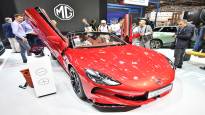Europeans are increasingly buying Chinese cars and equipment. China’s growing trade power has become a headache for Germany and the entire European Union.
BERLIN Did you think that mainly tilpe wool and easily manufactured products such as T-shirts or face masks are imported from China to Europe?
If you thought so, you were wrong. Now, the share of Chinese products, especially in the highly processed industrial goods, machines and cars used in the EU, is increasing.
At the same time, Germany’s traditional strong position as a producer of these is shaking. The share of German products in imports from other EU countries has decreased.
In the graphic below, you can see how, for example, the import of medicines, information technology and electrical equipment from Germany and China to the EU has changed.
The cornerstone of the German economy is the car industry, and China is a problem for it in at least two ways.
First of all, Chinese cheap electric cars are coming to Europe in ever greater numbers – and so to Finland. Chinese-owned Geely and MG have already taken third and fourth place in the list of the most popular electric car brands in Europe, says Handelsblatt economic newspaper.
At the top are the American Tesla and the German Volkswagen, in that order.
At the same time, the demand for German electric cars has declined. Their orders this year have only been 60 percent from last year’s level.
The Chinese also want electric cars
Second, German car factories are struggling in the Chinese market and losing their positions there as well. In addition to Volkkaris, the sales of Bemars and Mersues in China will also decrease.
For a long time, German car brands trusted that the demand for combustion engines in China would only continue to grow. For prosperous Chinese, German luxury cars were status symbols, while Chinese brands were considered technologically backward.
Now the wind has turned and the Chinese have also taken a liking to electric cars. It’s a big problem, especially for Volkswagen, whose combustion engine cars are sold in China almost every second one.
However, German companies have invested increasingly large amounts of money in China in recent years, as shown in the following graphic. So the stakes are high.
More on the subject: Europe strives to break free from its dependence on China – however, statistics show that imports have doubled on the contrary
Germany drew up a China strategy
The German government would like to reduce its dependence on China, as the Russian war of aggression showed the risks of colluding with authoritarian states. China is clearly an even bigger trade partner for Germany than Russia was.
Chancellor By Olaf Scholz the government recently announced a special 64-page strategy to reduce dependence on China. How to implement it concretely is a more difficult matter.
In any case, the purpose is to try to identify the vulnerabilities of the economy, to make German companies aware of the risks of doing business in China, and to make it clear that the federal government will not bail out companies if they get into trouble.
A new phenomenon is that Chinese investors are increasingly turning their eyes to Germany. Hamburg’s port terminal is already a quarter owned by the Chinese.
The German Ministry of Economy is currently investigating several Chinese purchase offers from German companies. Just a couple of weeks ago, the ministry blocked one sale in which a German Kleo satellite company would have been taken over by the Chinese.
Read in this story how Europe’s attitude towards China has changed in a few years.
Trade between the EU and China has already swelled to 900 billion euros after the pandemic:
The EU came to support
The EU Commission recently announced that it is starting to investigate the pricing of Chinese car dealers.
In Brussels, it is suspected that the Chinese are artificially depressing the prices of their cars with state subsidies. It would weaken the competitiveness of not only German but also French, Italian and Spanish car factories.
China was angered by the EU’s settlement intentions. In its opinion, it is a “clear-cut protectionist measure”, i.e. an attempt to protect European car production from competition.
Now there is a fear in Europe that China will reciprocally impose tariffs or other additional charges on European car brands.
EU Trade Commissioner Valdis Dombrovskis will travel to China on the weekend for a four-day visit. The goal is to mediate and stabilize the business relationship. If Dombrovskis does not succeed in detente, diplomatic relations may become even more complicated.
This graphic shows how EU countries import many times more machinery and equipment from China than, for example, ten years ago.
